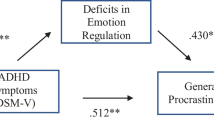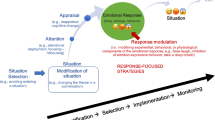Abstract
Emotion dysregulation is associated with Attention-Deficit/Hyperactivity Disorder (ADHD) and may contribute to the functional impairment experienced by people with this disorder. The present study addressed the following questions: 1) Does emotion dysregulation mediate the relationship between ADHD and key domains of functioning in adults with ADHD?, and, 2) If so, which emotion regulation strategies might further explain this relationship? 159 participants (59 ADHD, 100 non-ADHD) were recruited through Amazon’s Mechanical Turk. Participants completed a variety of online self-report measures assessing ADHD symptoms, emotion regulation deficits and strategies, symptoms of depression and anxiety, relationship satisfaction, and overall functional impairment. Deficits in emotion regulation mediated the relationship between ADHD and internalizing symptoms, relationship satisfaction, and overall functional impairment. In exploratory analyses, avoidance mediated the relationship between ADHD and deficits in emotion regulation, but reappraisal and suppression did not. Serial mediation analyses indicated that the indirect effects of avoidance alone, apart from deficits in emotion regulation, partially explained the relationship between ADHD and nearly all outcomes. These results are consistent with past literature indicating that emotion regulation problems help explain the presence of depressive symptoms and romantic relationship impairment in adults with ADHD, and add that anxiety symptoms, poorer friendship quality, and greater functional impairment also may be influenced by emotion regulation problems. This study also identifies a specific emotion regulation strategy – avoidance – as a potential contributor to these outcomes. Future work should investigate contexts in which avoidant coping is most problematic so that interventions can be adapted accordingly.






Similar content being viewed by others
References
Abramovitch, A., & Schweiger, A. (2009). Unwanted intrusive and worrisome thoughts in adults with attention deficit\hyperactivity disorder. Psychiatry Research, 168(3), 230–233. https://doi.org/10.1016/j.psychres.2008.06.004.
Banaschewski, T., Jennen-Steinmetz, C., Brandeis, D., Buitelaar, J. K., Kuntsi, J., Poustka, L., et al. (2012). Neuropsychological correlates of emotional lability in children with ADHD. Journal of Child Psychology and Psychiatry, 53(11), 1139–1148. https://doi.org/10.1111/j.1469-7610.2012.02596.x.
Barkley, R. A. (2011a). Barkley deficits in executive functioning rating scale (BDEFS). New York: Guilford.
Barkley, R. A. (2011b). Barkley functional impairment scale (BFIS). New York: Guilford.
Barkley, R. A. (2015). Emotional dysregulation is a core component of ADHD. In R. A. Barkley (Ed.), Attention-deficit hyperactivity disorder: A handbook for diagnosis and treatment (pp. 81–115). New York: Guilford Press.
Barkley, R. A., Murphy, K. R., & Fischer, M. (2010). ADHD in adults: What the science says. Guilford Press.
Becker, S. P., Langberg, J. M., Evans, S. W., Girio-Herrera, E., & Vaughn, A. J. (2015). Differentiating anxiety and depression in relation to the social functioning of young adolescents with ADHD. Journal of Clinical Child & Adolescent Psychology, 44(6), 1015–1029. https://doi.org/10.1080/15374416.2014.930689.
Berghoff, C. R., Pomerantz, A. M., Pettibone, J. C., Segrist, D. J., & Bedwell, D. R. (2012). The relationship between experiential avoidance and impulsiveness in a nonclinical sample. Behaviour Change, 29(1), 25–35. https://doi.org/10.1017/bec.2012.6.
Berking, M., Ebert, D., Cuijpers, P., & Hofmann, S. G. (2013). Emotion regulation skills training enhances the efficacy of inpatient cognitive behavioral therapy for major depressive disorder: A randomized controlled trial. Psychotherapy and Psychosomatics, 82(4), 234–245. https://doi.org/10.1159/000348448.
Bond, F. W., Hayes, S. C., Baer, R. A., Carpenter, K. M., Guenole, N., Orcutt, H. K., et al. (2011). Preliminary psychometric properties of the acceptance and action questionnaire–II: A revised measure of psychological inflexibility and experiential avoidance. Behavior Therapy, 42(4), 676–688. https://doi.org/10.1016/j.beth.2011.03.007.
Bruner, M. R., Kuryluk, A. D., & Whitton, S. W. (2015). Attention-deficit/hyperactivity disorder symptom levels and romantic relationship quality in college students. Journal of American College Health, 63(2), 98–108. https://doi.org/10.1080/07448481.2014.975717.
Buhrmester, D., & Furman, W. (2008). The network of relationships inventory: Relationship qualities version. Unpublished measure, University of Texas at Dallas.
Bunford, N., Evans, S. W., & Langberg, J. M. (2014). Emotion dysregulation is associated with social impairment among young adolescents with ADHD. Journal of Attention Disorders, 22(1), 66–82. https://doi.org/10.1177/1087054714527793.
Bunford, N., Evans, S. W., & Wymbs, F. (2015). ADHD and emotion dysregulation among children and adolescents. Clinical Child and Family Psychology Review, 18(3), 185–217. https://doi.org/10.1007/s10567-015-0187-5.
Chronis-Tuscano, A., Molina, B. S., Pelham, W. E., Applegate, B., Dahlke, A., Overmyer, M., & Lahey, B. B. (2010). Very early predictors of adolescent depression and suicide attempts in children with attention-deficit/hyperactivity disorder. Archives of General Psychiatry, 67(10), 1044–1051. https://doi.org/10.1001/archgenpsychiatry.2010.127.
Da Fonseca, D., Seguier, V., Santos, A., Poinso, F., & Deruelle, C. (2008). Emotion understanding in children with ADHD. Child Psychiatry & Human Development, 40(1), 111–121. https://doi.org/10.1007/s10578-008-0114-9.
Espejo, E. P., Gorlick, A., & Castriotta, N. (2017). Changes in threat-related cognitions and experiential avoidance in group-based transdiagnostic CBT for anxiety disorders. Journal of Anxiety Disorders, 46, 65–71. https://doi.org/10.1016/j.janxdis.2016.06.006.
Gratz, K. L., & Roemer, L. (2004). Multidimensional assessment of emotion regulation and dysregulation: Development, factor structure, and initial validation of the difficulties in emotion regulation scale. Journal of Psychopathology and Behavioral Assessment, 26(1), 41–54. https://doi.org/10.1023/b:joba.0000007455.08539.94.
Gross, J. J., & John, O. P. (2003). Individual differences in two emotion regulation processes: Implications for affect, relationships, and well-being. Journal of Personality and Social Psychology, 85(2), 348–362. https://doi.org/10.1037/0022-3514.85.2.348.
Harty, S. C., Miller, C. J., Newcorn, J. H., & Halperin, J. M. (2009). Adolescents with childhood ADHD and comorbid disruptive behavior disorders: aggression, anger, and hostility. Child Psychiatry and Human Development, 40(1), 85–97. https://doi.org/10.1007/s10578-008-0110-0.
Hayes, A. F. (2013). Introduction to mediation, moderation, and conditional Process analysis. New York: Guilford Press.
Hendrick, S. S., Dicke, A., & Hendrick, C. (1998). The relationship assessment scale. Journal of Social and Personal Relationships, 15(1), 137–142. https://doi.org/10.1177/0265407598151009.
Hsu, C. F., Eastwood, J. D., & Toplak, M. E. (2017). Differences in perceived mental effort required and discomfort during a working memory task between individuals at-risk and not at-risk for ADHD. Frontiers in Psychology, 8. https://doi.org/10.3389/fpsyg.2017.00407.
Jarrett, M. A. (2016). Attention-deficit/hyperactivity disorder (ADHD) symptoms, anxiety symptoms, and executive functioning in emerging adults. Psychological Assessment, 28(2), 245–250. https://doi.org/10.1037/pas0000190.
Kashdan, T. B., Barrios, V., Forsyth, J. P., & Steger, M. F. (2006). Experiential avoidance as a generalized psychological vulnerability: Comparisons with coping and emotion regulation strategies. Behaviour Research and Therapy, 44(9), 1301–1320. https://doi.org/10.1016/j.brat.2005.10.003.
Kessler, R. C., Adler, L., Barkley, R., Biederman, J., Conners, C. K., Demler, O., et al. (2006). The prevalence and correlates of adult ADHD in the United States: Results from the National Comorbidity Survey Replication. American Journal of Psychiatry, 163(4), 716–723. https://doi.org/10.1176/appi.ajp.163.4.716.
Knouse, L. E., & Mitchell, J. T. (2015). Incautiously optimistic: Positively valenced cognitive avoidance in adult ADHD. Cognitive and Behavioral Practice, 22(2), 192–202. https://doi.org/10.1016/j.cbpra.2014.06.003.
Knouse, L. E., Mitchell, J. T., Brown, L. H., Silvia, P. J., Kane, M. J., Myin-Germeys, I., & Kwapil, T. R. (2008). The expression of adult ADHD symptoms in daily life: An application of experience sampling methodology. Journal of Attention Disorders, 11(6), 652–663. https://doi.org/10.1177/1087054707299411.
Knouse, L. E., Zvorsky, I., & Safren, S. A. (2013). Depression in adults with attention-deficit/hyperactivity disorder (ADHD): The mediating role of cognitive-behavioral factors. Cognitive Therapy and Research, 37(6), 1220–1232. https://doi.org/10.1007/s10608-013-9569-5.
Knouse, L. E., Teller, J., & Brooks, M. A. (2017). Meta-analysis of cognitive–behavioral treatments for adult ADHD. Journal of Consulting and Clinical Psychology, 85(7), 737–750. https://doi.org/10.1037/ccp0000240.
Marsh, L. E., Norvilitis, J. M., Ingersoll, T. S., & Li, B. (2015). ADHD symptomatology, fear of intimacy, and sexual anxiety and behavior among college students in China and the United States. Journal of Attention Disorders, 19(3), 211–221. https://doi.org/10.1177/1087054712453483.
Martel, M. M. (2009). Research review: A new perspective on attention-deficit/hyperactivity disorder: Emotion dysregulation and trait models. Journal of Child Psychology and Psychiatry, 50(9), 1042–1051. https://doi.org/10.1111/j.1469-7610.2009.02105.x.
McKee, T. E. (2017). Peer relationships in undergraduates with ADHD symptomatology: Selection and quality of friendships. Journal of Attention Disorders, 21(12), 1020–1029. https://doi.org/10.1177/1087054714554934.
Moore, S. A., Zoellner, L. A., & Mollenholt, N. (2008). Are expressive suppression and cognitive reappraisal associated with stress-related symptoms? Behaviour Research and Therapy, 46(9), 993–1000. https://doi.org/10.1016/j.brat.2008.05.001.
Musser, E. D., Backs, R. W., Schmitt, C. F., Ablow, J. C., Measelle, J. R., & Nigg, J. T. (2011). Emotion regulation via the autonomic nervous system in children with attention-deficit/hyperactivity disorder (ADHD). Journal of Abnormal Child Psychology, 39(6), 841–852. https://doi.org/10.1007/s10802-011-9499-1.
Ottenbreit, N. D., & Dobson, K. S. (2004). Avoidance and depression: The construction of the cognitive–behavioral avoidance scale. Behaviour Research and Therapy, 42(3), 293–313. https://doi.org/10.1016/s0005-7967(03)00140-2.
Radloff, L. S. (1977). The CES-D scale: A self-report depression scale for research in the general population. Applied Psychological Measurement, 1(3), 385–401. https://doi.org/10.1177/014662167700100306.
Reimherr, F. W., Marchant, B. K., Strong, R. E., Hedges, D. W., Adler, L., Spencer, T. J., et al. (2005). Emotional dysregulation in adult ADHD and response to atomoxetine. Biological Psychiatry, 58(2), 125–131. https://doi.org/10.1016/j.biopsych.2005.04.040.
Seymour, K. E., Chronis-Tuscano, A., Iwamoto, D. K., Kurdziel, G., & MacPherson, L. (2014). Emotion regulation mediates the association between ADHD and depressive symptoms in a community sample of youth. Journal of Abnormal Child Psychology, 42(4), 611–621. https://doi.org/10.1007/s10802-013-9799-8.
Shaw, P., Stringaris, A., Nigg, J., & Leibenluft, E. (2014). Emotion dysregulation in attention deficit hyperactivity disorder. American Journal of Psychiatry, 171(3), 276–293. https://doi.org/10.1176/appi.ajp.2013.13070966.
Skirrow, C., & Asherson, P. (2013). Emotional lability, comorbidity and impairment in adults with attention-deficit hyperactivity disorder. Journal of Affective Disorders, 147(1), 80–86. https://doi.org/10.1016/j.jad.2012.10.011.
Sobanski, E., Brüggemann, D., Alm, B., Kern, S., Deschner, M., Schubert, T., et al. (2007). Psychiatric comorbidity and functional impairment in a clinically referred sample of adults with attention-deficit/hyperactivity disorder (ADHD). European Archives of Psychiatry and Clinical Neuroscience, 257(7), 371–377. https://doi.org/10.1007/s00406-007-0712-8.
Sobanski, E., Banaschewski, T., Asherson, P., Buitelaar, J., Chen, W., Franke, B., et al. (2010). Emotional lability in children and adolescents with attention deficit/hyperactivity disorder (ADHD): Clinical correlates and familial prevalence. Journal of Child Psychology and Psychiatry, 51(8), 915–923. https://doi.org/10.1016/s0924-9338(10)70025-0.
Spitzer, R. L., Kroenke, K., Williams, J. B., & Löwe, B. (2006). A brief measure for assessing generalized anxiety disorder: the GAD-7. Archives of Internal Medicine, 166(10), 1092–1097. https://doi.org/10.1001/archinte.166.10.1092.
Strohmeier, C. W., Rosenfield, B., DiTomasso, R. A., & Ramsay, J. R. (2016). Assessment of the relationship between self-reported cognitive distortions and adult ADHD, anxiety, depression, and hopelessness. Psychiatry Research, 238, 153–158. https://doi.org/10.1016/j.psychres.2016.02.034
Torrente, F., López, P., Alvarez Prado, D., Kichic, R., Cetkovich-Bakmas, M., Lischinsky, A., & Manes, F. (2014). Dysfunctional cognitions and their emotional, behavioral, and functional correlates in adults with attention deficit hyperactivity disorder (ADHD) is the cognitive-behavioral model valid? Journal of Attention Disorders, 18(5), 412–424. https://doi.org/10.1177/1087054712443153.
Young, S. (2005). Coping strategies used by adults with ADHD. Personality and Individual Differences, 38(4), 809–816. https://doi.org/10.1016/j.paid.2004.06.005.
Yuill, N., & Lyon, J. (2007). Selective difficulty in recognising facial expressions of emotion in boys with ADHD. European Child & Adolescent Psychiatry, 16(6), 398–340. https://doi.org/10.1007/s00787-007-0612-5.
Acknowledgements
This research was supported by a University of Richmond Undergraduate Summer Research Fellowship awarded to the first and third authors and a University of Richmond Faculty Summer Research Fellowship awarded to the second author.
Funding
This work was funded by a University of Richmond School of Arts and Sciences Undergraduate Summer Research Fellowship awarded to the first and third authors and a University of Richmond School of Arts and Sciences Faculty Summer Research Fellowship awarded to the second author.
Author information
Authors and Affiliations
Corresponding author
Ethics declarations
Conflict of Interest
Elizabeth A. Bodalski, Laura E. Knouse, and Dmitry Kovalev declare no conflict of interest in publishing this work.
Experiment Participants
All data collection procedures were approved by the Institutional Review Board at the University of Richmond and informed consent was obtained from all study participants.
Electronic supplementary material
ESM 1
(DOCX 974 kb)
Rights and permissions
About this article
Cite this article
Bodalski, E.A., Knouse, L.E. & Kovalev, D. Adult ADHD, Emotion Dysregulation, and Functional Outcomes: Examining the Role of Emotion Regulation Strategies. J Psychopathol Behav Assess 41, 81–92 (2019). https://doi.org/10.1007/s10862-018-9695-1
Published:
Issue Date:
DOI: https://doi.org/10.1007/s10862-018-9695-1




